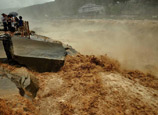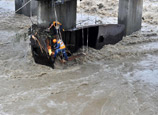
NICOSIA, July 12 (Xinhua) -- Cyprus President Nicos Anastasiades said on Friday that the dangers for the island's economy are not yet over following a near meltdown which led to an EU/IMF bailout in March.
The Cypriot economy received a major hit when the eastern Mediterranean island's banking system, the main pillar of its economy, was virtually demolished after international lenders ordered major depositors to forego over half of their savings in exchange for a 10-billion-euro bailout (13-billion-U.S. dollar) over a three year period.
Cyprus was forced to accept a painful austerity program to help it readjust its economy. However, Anastasiades told a press conference he convened to take stock of four months in office that the program has helped avert a total collapse of the economy and avoid a disastrous payments default.
"I do not claim that the dangers are over or that the painful consequences of the adjustment program have been overcome. On the contrary, if we want to avoid a worse situation we have to consistently apply what we have agreed so as to get additional assistance from our European partners," Anastasiades added.
He also said his government will pursue those responsible for the near-collapse of the banking sector and the fiscal difficulties which have forced Cyprus to apply for bailout.
Police are already contacting a criminal investigation into alleged irregularities in the purchase of Russian Uniastrum Bank by Bank of Cyprus and a panel of inquiry is investigating the circumstances and the reasons which caused the near meltdown of the economy.
"I want to stress that none of those who led out country to this tragic state will go unpunished," Anastasiades said.
Anastasiades came to power after a landslide victory in a presidential election in February, but was burdened with handling an economy in ruins and signing a bailout agreement which had been negotiated and agreed between the former government and international lenders.
He said the government will seek whatever financial help it can get from the EU and will also stick to austerity measures aimed at cutting back on government spending and increasing revenue to run the government and return to growth.
The president said he hoped that there will never be need for Cyprus to sell off its gold reserves, one of the measures stipulated in the agreement with international lenders.
"I want to believe that there will never be such a need," Anastasiades said.
Technically, Cypriot gold reserves amounting to 14 tons are owned by the Central Bank of Cyprus, which says it has never been consulted on the sale of gold.
The bailout agreement stipulates that the government will sell "excess" gold worth about 400 million euros to help it through the crisis. (1 euro = 1.30 U.S. dollars)
















 Typhoon Soulik kills one in Taiwan, brings rainstorms to Fujian
Typhoon Soulik kills one in Taiwan, brings rainstorms to Fujian


![]()
